
-
16.06.2022
3rd IABEP Expert Series Event focuses on circular economy
-
IABEP continued its successful online discussion format with another Expert Series Event entirely dedicated to the “hot” topic of circular economy. Experts from industry and academia shared case studies and discussed their experiences with the participants.
Marco Holzer from Trumpf Laser presented the successful “Xchange” program, whereby Trumpf offers its customers financial incentives to encourage them to return defective parts. The parts are subsequently repaired and re-integrated in the company’s value-creation process. Participants discussed the conflict between consumers’ quest for ever more innovative and state-of-the art products on the one hand and re-used, durable parts on the other.
Dr. Mohd Ridzuan bin Darun from UMP Malaysia shared findings from a current research project that focuses on using waste water of a petrochemical plant as a resource for producing hydrogen. “What used to be waste can now generate revenues” was one of Dr. Ridzuan’s key messages. The ensuing discussion addressed numerous challenges. Primarily, there is the key issue of clearly defining the system to be analyzed, but a further critical aspect is educating stakeholders about the potential benefits of circular economy concepts.
The final contribution came from Prof. Maud Schmiedeknecht (ESB Business School), who introduced the participants to the “circular navigator”, a conceptual tool for designing circular economy business models. An interesting debate arose about the impact of current supply chain disruptions on circular economy concepts. The shortage of component supplies and long lead times in global supply networks were identified as drivers for motivating companies to focus more on re-using available resources.
Moreover, a point raised by all speakers was the need to use the data being gathered to develop and share good practices across industries and supply chains.
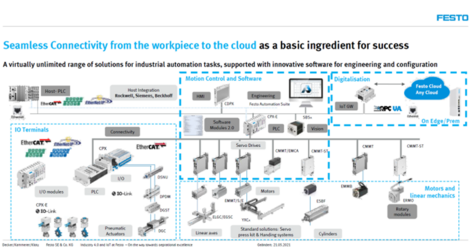
-
25.05.2021
2nd IABEP Expert Series Event offers valuable exchange
"Making the business case for IoT and Artificial Intelligence"
-
IABEP hosted another online event in its Expert Series, bringing together participants from the US, Europe, Asia, and Australia. Interested IABEP members and supporters from academia and business practice joined our experts in discussing the opportunities and challenges in IoT implementation.
Eberhard Klotz, Christian Kammerer and Jacob Decker from corporate IABEP member Festo outlined how the concept of Industry 4.0 is inextricably linked with artificial intelligence and machine learning: “You cannot do the one without the other.” They shared Festo’s experience of integrating IoT concepts and capabilities with respect to both individual products and entire manufacturing processes. A number of examples of digital transformation and AI-driven projects were showcased, which sparked strong interest among participants and a lively debate.
Several challenges posed by AI and a shift to industry 4.0. were highlighted including heterogeneous or fragmented architecture, security issues and the need for a new skillset not only from IT, but also from an OT perspective.
Prof. Dr. Natividad Martinez Madrid as Head of the IoT Lab at Reutlingen University contributed insights into the application of IoT to the medical field, commonly termed as the “Internet of Medical Things (IoMT)”. IoMT encompasses the use of IoT for medical and health related purposes, data collection and analysis for research and monitoring, sparking a new wave of what is known as “smart healthcare”.
Referring to current research, Professor Martinez Madrid claimed that the market of IoMT is expected to be worth a staggering $ 534.3 billion by 2025. She went on to demonstrate the far-reaching impact of IoMT, which beyond generating cost savings, can making significant improvements to diagnosis, treatment and general management of illnesses and diseases. The result is an enhanced overall patient experience.
Professor Martinez Madrid presented the use of digital twins, whereby a virtual representation of a patient is created on which the effect of different drugs can be tested. This type of personalized medical treatment is groundbreaking and helps in the selection of the best suited drugs for the given case.
A lively discussion ensued among experts and participants in which many issues with respect to ethics, legislation, usability, costs and security were addressed.

-
28.11.2020
New IABEP Expert Series
First Online Workshop - Cyber Security in Global Operations
-
On 27 November 2020, IABEP was very excited to launch the first round of its IABEP expert series. The discussion focused on the topic of cyber security in global operations.
Current studies highlight the fact that 81% of top executives fear that their organisations are not sufficiently protected against cyber threats, yet the startling reality is that the majority of SMEs do not have an integrated policy plan against cyber risk. Throughout the course of this first expert session, it became clear that there are wide felt concerns among industry representatives regarding this topic and that many organisations do, indeed, see a sense of urgency in developing a cyber security plan.
The reality with respect to implementation, however, looks somewhat different. The vast majority of SMEs do not have an integrated policy plan for cyber risk security. Challenges include the fact that the strategic process in many organisations is typically managed by headquarters and the protocol is more often than not too strict and needs to be scaled down.
It was noted that many companies do, in fact, make a first step in terms of undertaking a maturity scan. A general consensus was found among participants that it is vital to bring in external consultants to conduct such security tests as internal expertise is frequently lacking. Still, many organisations, as one participant put it, “resemble toddlers starting to walk” and the problem boils down to the fact that employees lack knowledge about how well their data is protected or at risk.
On the one hand, participants agreed that building awareness of cyber security issues is critical. Still, concerns were voiced that understanding of the risks is not enough. Engagement has to be invoked on the part of the workforce, which only comes about when organisations embark upon a clear change management process to tackle the area.
The experts Ulrich Schuster, Joan Balcells and Jaime Loaiza advocated making a pitch as an initial step in which concrete evidence is presented to convince the workforce that they are at risk. A mindset change was also called for: instead of viewing cyber security as a cost factor, senior executives might better consider it as an investment in curbing potential future losses from realistic threats.
The way ahead is certainly beset with a number of challenges. Silo thinking has to be overcome, and there is a clear deficit in the training staff training. Above all, a worry that was voiced is that many of the available plans appear more relevant to larger companies than to SMEs.
Our experts from a2secure (Spain) and Atos (Germany) shared experiences from their everyday dealings with companies. Ways forward, from their perspective, include building bridges between operations and technical departments, integrating cyber security training in onboarding programmes, developing more customised training for specialised problems, defining concrete security KPIs and creating networks across organisations to exchange view on current issues and potential solutions in the domain of cyber security. Moreover, there was a strong conviction that the topic of cyber security should be given precedence in the overall strategy of companies with budgets being awarded to the tackling the issue.
Strong leadership supported by the necessary technical expertise are definite factors, which can impact success in implementing strategies to combat this very current and real threat. As one IABEP member put it, increased digitalisation and the COVID crisis have pushed more and more tasks and activities into online formats. As such, vulnerability has increased and we need to be better equipped against costly cyber attacks.
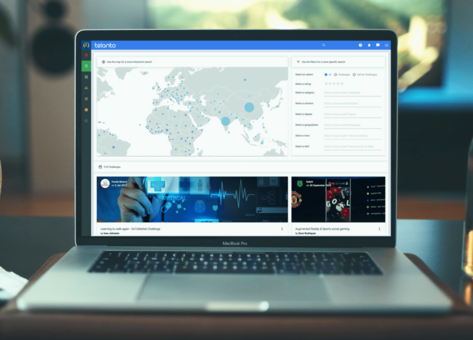
-
25.09.2020
A new digital project collaboration platform for all IABEP members
Bringing academic expertise and student talent to our corporate members through project assignments, graduation projects and theses.
-
The IABEP network is continuing to grow and in the meantime spans institutions across three continents. A particular focus lies on the cross-border cooperation between industry partners and universities. IABEP brings academic expertise and student talent to corporate members through projects, international internships and theses.
To facilitate this cooperation, we will be using a professional, state-of-the-art digital collaboration platform. Over the past few months, we have evaluated our needs and have searched for the best-suited technology. We are happy to announce that IABEP will soon be inviting you to engage in university-industry collaboration via the innovative software solution offered by Telanto (more info on Telanto can be found here).
We are currently establishing an IABEP community in the Telanto environment and expect to go live within the next few weeks. Watch out for an e-mail invitation asking you to join our IABEP platform!

-
23.09.2020
Business case models for returnable packaging solutions
IABEP corporate member, Alsco, is a leading expert in returnable transport packaging solutions. Alsco and academic member ESB Business School joined forces in an applied research project to investigate the topic in more detail:
-
What are the cost and benefit implications of returnable transport packaging solutions for multi-national enterprises? Which contingency factors need to be considered in order to assess their economic attractiveness?
The project was realised as a series of case studies by two students of ESB Business School in cooperation with four IABEP member companies in Germany. Together with Alsco experts, they developed a generic business case model for returnable transport packaging solutions and tested the model in several usage scenarios together with the case companies. The project offered students a unique opportunity to engage in real-life, applied research and provided IABEP corporate partners with a detailed analysis of their specific use case that is ready for implementation.
If you have a suggestion for an applied research project, please get in touch with us and simply send a mail to office@
iabep.org .
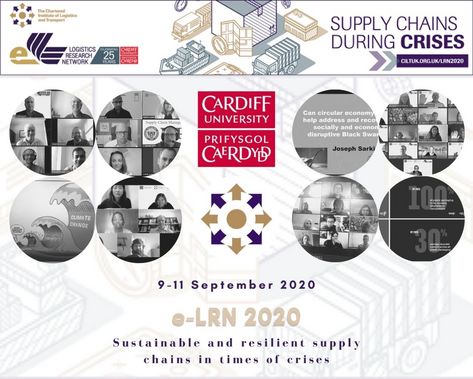
-
22.09.2020
An empirical study into the impact of digitalisation on global supply chains
Sustainable and resilient supply chains during times of crises
-
Building on their quantitative research into the impact of digitalisation on global supply chains, professors Ed Sweeney, Andreas Taschner and Hazel Grünewald from academic IABEP members ESB Business School and Aston University, felt impelled to investigate some of the key issues arising in a further qualitative study. The findings were presented at the recent e-LRN 2020 Special Web Conference on “Sustainable and resilient supply chains during times of crises”. The conference, due to Covid-19, took place online on 9-11 September and was hosted by Cardiff Business School in collaboration with the LRN (Logistics Research Network) committee of the CILT (The Chartered Institute of Logistics and Transport).
The paper was delivered in the “innovative technology” stream, which was chaired by Prof. Sweeney himself. The study focuses, in particular, on trying to understand the current adoption rate of a range of existing and emerging digital technologies in global supply chains, identifying perceived opportunities and challenges, and clarifying the key factors driving (and inhibiting) their deployment.
The research is largely exploratory in nature. Phase 1 of the project was administered as an online survey with a global sample of respondents from various supply chain functions. A larger team of scholars from the IABEP network were involved in the designed and delivery of the survey. The researchers discovered significant differences in adoption patterns between company sizes and a widening gap (or a “digital divide”) between industry “leaders” and “laggards” in terms of technology adoption. Perceived benefits and challenges were also shown to differ significantly between companies of different sizes. The study covers a wide range of existing and emerging technologies and points to very diverse adoption patterns depending on the technology types. Phase 1 results also suggest that there is a significant correlation between adoption of digital technologies and different dimensions of company performance. Phase 1 results can be shared with IABEP members upon request.
In phase 2 of the study, the survey results are currently being explored in more detail by means of semi-structured interviews with industry experts from all tiers of the supply chain. The results provide personal insights into company motivations and implementation approaches. The research delivers an up-to-date overview of adoption rates across company types and countries as well as a deeper understanding of drivers and inhibitors behind these adoption patterns.
Practitioners can use the research results for benchmarking their own company’s position along the adoption continuum and can draw lessons for further digitalisation initiatives from the identified challenges and adoption approaches.
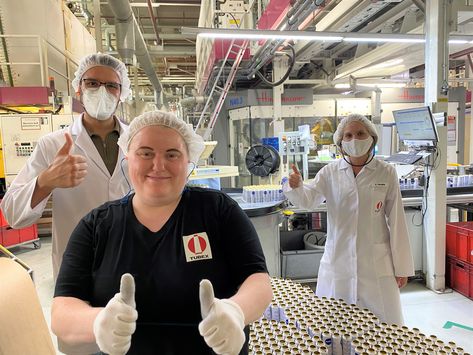
-
20.09.2020
Tubex introduces idea management system at their plant in Rangendingen
ESB students work on final-year theses and projects to support the development and rollout of the company’s idea managent system
-
Wanting to build on their previous success, Tubex, IABEP corporate partner, decided to introduce an idea management system at their plant in Rangendingen. The new system replaces the traditional suggestion scheme that was in place. In 2017, Tubex piloted a software-based innovation process at their factory in Brazil. The goal of this innovation system was to generate new ideas with respect to optimising processes, products and services. By involving the entire workforce, the company also sought to increase employee loyalty, foster a sense of team spirit and improve the corporate culture. The management team in Brazil received considerable guidance from Antonio Teixeira, former CEO of Brasilata. Teixeira led his own company to success with a similar scheme, approving over 1 million ideas in his 37-year career. Teixeira is also a professor at FGV, a partner university of the IMX programme at ESB Business School.
Tubex’s CEO, Leopold Werdich, made the decision to connect Teixeira with Prof. Hazel Grünewald to consider how the idea management system could be adapted to the German environment and culture. Together with a defined task force from the company and with significant input from Teixeira, Prof. Grünewald went on to design and deliver training sessions for managers and employees to kick-start the process.
In order to derive as many lessons learned and good practices from the Brazilian experience, two empirical studies were also conducted by students of ESB Business School. The studies were carried out within the framework of final-semester theses under the supervision of Prof. Grünewald on the following topics:
- Determining motivational factors encouraging front-line employee participation in the idea suggestion system at TUBEX - Sebastian Haumann (BSc. International Business)
- Potential success factors and challenges with respect to introducing idea management at the Tubex factory in Rangendingen based on the Brazilian experience – Jevgenia Lang (MBA-PT)
To support the idea management system further, Grünewald guided two part-time MBA student projects focusing on the following areas:
- How to develop and implement a uniform team culture that fosters innovation in a 5-shift production company
- Development of a corporate culture and structure for TUBEX that support and demand innovation
The benefits of such projects strongly align with the goals of IABEP. Students get to apply the knowledge that they gain from business courses to real-life situations and companies profit from advice and recommendations based on theoretical and empirical research.
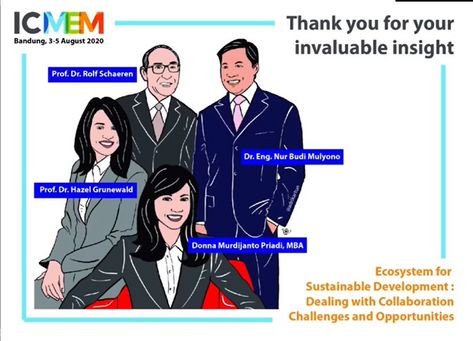
-
06.08.2020
The 5th International Conference on Management in Emerging Markets (ICMEM) 2020
“ Sustainable Development: Orchestrating Business to Respond to Society’s Latest Challenges ”
-
From August 3-5, 2020 the 5th Annual ICMEM Conference “Management in Emerging Markets” took place online, hosted by the IABEP partners SMB ITB from Bandung, Indonesia. The theme of the conference was “Sustainable Development: Orchestrating Business to Respond to Society’s Latest Challenges”.
Representatives from companies and universities from all over the world exchanged views on the notion of sustainable development. The conference addressed, in particular, the ways in which business can respond to society’s latest challenges including issues related to the well-being of people at many levels and environmental protection in an increasingly capitalised global world.
In the last decade, we have witnessed the contribution of emerging countries such as Brazil, China, India and South Africa to the global economy, signalling the narrowing of the gap of income and wealth between emerging and developed countries. Their contribution can also be shown by the fact that about half of the G-20 members come from emerging countries.
Prof. Dr. Hazel Grünewald delivered a paper on the challenges and opportunities faced when trying to establish a cross-border ecosystem with players from emerging markets aimed at fostering international teaching and research. She focused on the case of IABEP to showcase some of the issues and the potential that such an ecosystem presents. According to Grünewald, many projects begin in an opportunistic fashion. In some cases, a clear need is identified internally and driven by the internal strategy. Alternatively, opportunities may present themselves via external sources. In both cases, due diligence has to be pursued to ensure that these opportunities align with the varying strategies of participating members and are viable.
Since business and academic environments are extremely dynamic, milestones and collaborative ventures have to be constantly reviewed, adapted, postponed or sometimes even abandoned if they cannot realistically be met.
When considering long-term sustainability, Grünewald stressed the importance of participating institutions having a clear idea of their core competences and main areas of expertise. Partners are better placed to contribute in certain fields, but have deficits in others. In the case of IABEP, the organisation seeks to form synergies among partners and to leverage sufficient expertise, so that all parties stand to benefit.
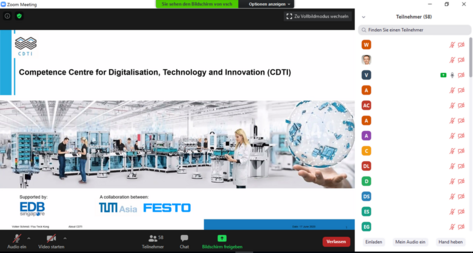
-
19.06.2020
60 experts from industry and academia in Europe and Southeast Asia engage in lively online exchange
Webinar: Industry 4.0 – competency development for factory of future
-
Industry 4.0 (I 4.0) is often coined “the next industrial revolution”. It constitutes a paradigm shift for production and logistics of the future. In cooperation with its partners FESTO Competence Centre for Digitalisation, Technology and Innovation (CDTI) Singapore, Technical University of Munich (TUM) Asia and the Singaporean-German Chamber of Industry and Commerce, the International Association of Business Engineering Professionals (IABEP) offered a webinar on Industry 4.0 concepts and its impact on professional training and business practice.
More than 60 experts from Europe and South East Asia joined the Webinar to discuss digitalisation and the resulting paradigm shift in manufacturing and logistics towards Factory of Future (FoF) and Logistics 4.0”.
Prof. Andreas Taschner, Professor at ESB Business School, Reutlingen University, Germany and Chairman of IABEP e.V. presented selected results of IABEP’s international study on the adoption of digital technologies in global supply chains. Volker Schmid and Fou Teck Kong from Festo Didactic presented the megatrends in Industry 4.0 and its effects on all areas of training. Both speakers highlighted that digitalisation is not an end in itself: “If you apply digital to a broken thing you will have a digital broken thing!”. Digital technologies must be understood and mastered by employees in order to achieve process improvements and increased customer benefits. Markus Wächter from TUM Asia discussed Singapore’s specific approach towards Industry 4.0 and presented the Smart Industry Readiness Index (SIRI).
Webinar participants engaged in a lively chat discussion during the session. Questions centered around the challenge of strengthening older staff’s IT affinity and the role universities must play in continuing education with regard to new digital technologies and the economic and societal challenges and risks that arise from digitalisation. Participants were particularly interested in ways to leverage university-industry collaboration for digitalisation initiatives.
The webinar served as a kick-off for a 2 day workshop that is scheduled to take place in fall 2020 within the framework of IABEP.
IABEP corporate member, Festo Didactic, is a world market leader in technical training and development. Festo Didactic offers a broad range of training and consulting services to maximize productivity and competitiveness for its customers.
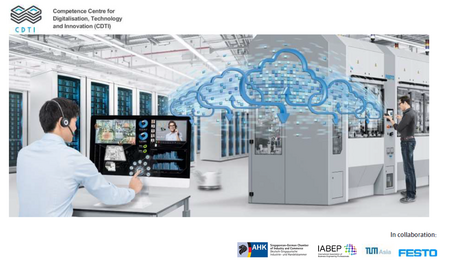
-
02.06.2020
Webinar: Industry 4.0 – Competency Development for Factory of Future (FoF)
In collaboration with the IABEP corporate partner FESTO, Technical University Munich (TUM) Asia and the Singaporean-German Chamber of Industry and Commerce
-
Join us on June 17 to find out more about Industry 4.0. This webinar will introduce participants to the industry 4.0 concept and give them an insight into the “Competency Development for Factory of Future”.
IABEP members may register an unlimited number of participants.
Here are the key facts:
Date: June 17th
Time: 15:00 - 17:30 Singapore time (09:00-11:30 CEST)
Title: Industry 4.0 – Competency Development for Factory of Future (FoF)
Key topics:
- Digitalisation in logistics and supply chains
- Digitalisation and the paradigm shift in manufacturing towards Factory of Future (FoF)
- Continuing Education and Training for Competency Development & Skills Upgrading
REGISTER NOW!